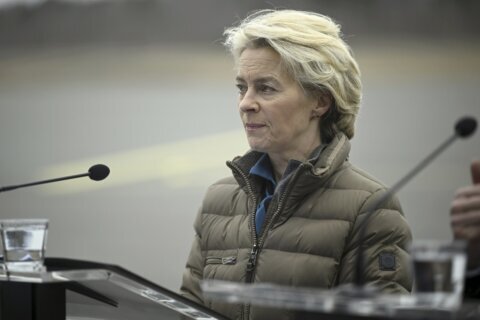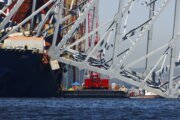MOSCOW (AP) — The presidents of Russia and Belarus said Thursday they have made significant progress on integrating their countries’ economies, including forming common energy and financial markets.
The moves would bolster Belarus as it faces Western sanctions imposed in response to political repression after a disputed presidential election, and to its forced diversion of an airliner carrying a prominent opposition journalist. They would also give Russia a strengthened position in a country that acts as a buffer with NATO members.
Russian President Vladimir Putin and Belarusian counterpart Alexander Lukashenko met Thursday for nearly four hours and announced that 28 programs strengthening integration were approved. The programs fall under a 1999 union agreement that calls for close political, economic and military ties but stops short of a full merger.
Russia has buttressed Belarus’ economy with cheap energy supplies and loans. But ties often have been strained, with Lukashenko scolding Moscow for trying to force him to relinquish control of prized economic assets and eventually abandon his country’s independence.
The programs include establishing a single gas market by the end of 2023.
The talks came as Russia and Belarus began military exercises that are to involve some 200,000 servicemen, including 2,500 Russians sent to Belarus. Officials say the exercises do not envisage specific countries as adversaries.
But the chief of Belarus’ general staff, Maj.-Gen. Viktor Gulevich, said the exercises “will become a kind of signal for the collective West of the futility of talking from a position of strength with the peoples of Belarus, Russia, Kazakhstan and other countries of the Collective Security Treaty Organization.”
After large demonstrations broke out in Belarus in August 2020 following a disputed election that officials said gave Lukashenko a sixth term in office, Russia said it would be willing to send troops to Belarus if the country requested them.
The demonstrations persisted for months, but subsided in the winter as police harshly cracked down on protesters. Authorities have arrested and imprisoned prominent opposition figures and closed many independent media outlets.
Following the presidents’ meeting, Putin said conditions in Belarus had “notably stabilized.”.
Copyright © 2024 The Associated Press. All rights reserved. This material may not be published, broadcast, written or redistributed.






